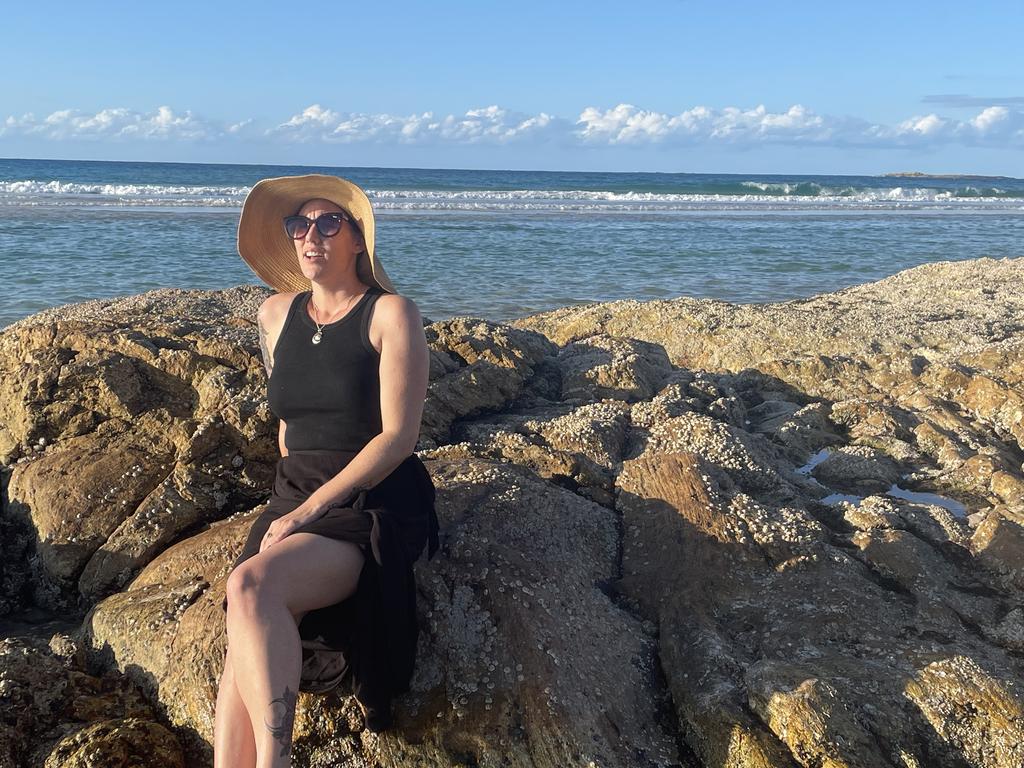Mum opens up about 20-year battle with crippling endometriosis
A Queensland mum has shared the crippling pain she endures thanks to a debilitating illness that one in nine Australian women face.
Karli Burgess was just 14 years old when she was unable to get out of bed because of her menstrual cycle.
“None of my friends went through what I went through. It did start to get to the point where I’m like, you know, ‘is it all in my head? Can I just not tolerate pain?’,” she told news.com.au.
“It was very hard being a teenager and going through all those sorts of pains.”
The 37-year-old from Caboolture, Queensland has opened up about her battle with crippling endometriosis.
The chronic condition causes tissue similar to the lining of the uterus (endometrium) to grow outside of the organ. The tissue, which has been found on every major organ of the body, often spreads to the bowel and fallopian tubes, causing extreme pain, heavy bleeding, and in many cases, infertility. There is no known cure.
Despite an estimated one in nine people with uteruses in Australia suffering from the issue, it remains incredibly misunderstood and it’s notoriously difficult to get a diagnosis. Research by Endometriosis Australia found it takes an average of 6.5 years to diagnose. Women often recall being laughed out of hospitals, denied treatment or told nothing can be done.

It wasn’t until Karli was 18 and working in the defence force that she finally got some answers.
She was missing up to three days of work every month as her period left her in the foetal position with no amount of pain relief working.
She went to a gynaecologist who suspected the then-teenager had endometriosis, and had keyhole surgery, called a laparoscopy, to inspect organs inside the belly and pelvic area.
It turned out she had stage three endometriosis and had further surgery to remove cysts on her ovaries.
But, within six months, her pain returned aggressively. In the decade since her diagnosis, Karli has had nine surgeries to remove the build up of cysts.
Now, it seems like her only option is to have a complete hysterectomy in order to live some semblance of a regular life.
Karli has had four children – and even more miscarriages – and so the hysterectomy is something she feels able to consider as “her baby making days are behind her” but it comes with its own risks.

It’s a major surgery that will require at least six weeks of recovery if it goes without incident and will change the entire make up of her body.
“It’s so hard to feel like I am not in between a rock and a hard place,” Karli said.
Every time Karli’s endometriosis flares up she is unable to do the simplest of tasks, let alone work, household chores or taking care of her children. She said most medications left her sedated and in a daze.
“It is literally like labour pains every month and when you’re in that sort of state and the pain is so high, it’s hard to hold conversations with people. It’s hard to stay focused on things that you need to do,” she said.
Confused about what step to take next, Karli turned to support groups on social media, where she found people discussing the use of medicinal cannabis to help ease their symptoms. She spoke to her GP, who gave her the green light to investigate further.
Through research, Karli found Cann I Help, a medicinal cannabis treatment clinic in Australia, and had to jump through a series of hurdles in order to secure her prescription.
Karli said it changed her life – she is no longer bed ridden by the pain of her menstruation. She can get up and look after her children and complete basic tasks around the home.
She’s been taking it for close to three years now, adding that there is a lot of misinformation about medicinal cannabis.
The mother-of-four said she’s met women going through chemotherapy who swear by cannabis gummies, and that people shouldn’t judge what they don’t understand.
She said having two teenagers made her think hard about the decision to take medicinal cannabis as she had always warned them about drugs – but in the end she felt she had no choice but to give it a go.

Dr Laurence Kemp, who is the head of medical at Cann I Help, said the medicine had only been available for seven years and doctors were often slow to adopt new treatments but it was slowly gaining acceptance.
He said the Therapeutic Goods Administration does require more conventional medicines be tired first however.
“Medicinal cannabis is beneficial to those who suffer chronic pain, particularly, we’ve even seen it alleviate the pain associated with conditions like endometriosis,” he said.
“There is evidence that it aids with mental health conditions like post-traumatic stress, it aids with sleep and anxiety, and can assist epilepsy sufferers too.
“Medicinal cannabis is used differently to recreational cannabis. THC and CBD are the cannabinoids used in medicinal cannabis and they’re both naturally present in cannabis plants. They’re the same raw materials applied differently. Prescribing doctors work closely with each individual patient to ensure the dosage is right for them.”
He did, however, add that the treatment didn’t work for everyone.






